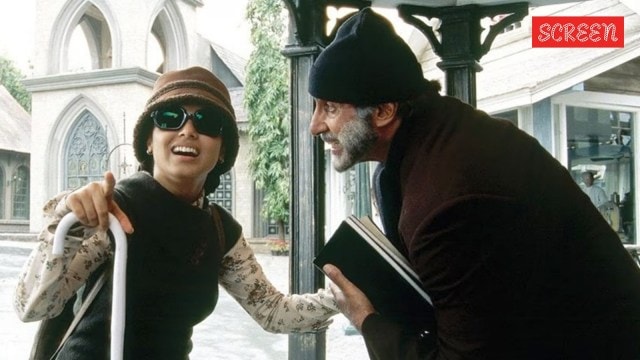Indian filmmakers, or in fact, most filmmakers around the world, are known by their distinct style of filmmaking. So when a filmmaker lets go of their style, and tries to venture into the unknown, audiences take notice. A similar thing happened when Sanjay Leela Bhansali, who had already become popular after Hum Dil De Chuke Sanam and Devdas, let go of his lavish and colourful sets and made a film that limited itself to blues and blacks. His 2005 film Black, starring Rani Mukerji and Amitabh Bachchan, had no songs and was seen as an experiment catered towards a niche audience. Released 20 years ago, the film was the start of a detour for Bhansali who went off his trademark style for this, Saawariya and Guzarish.
Black was the story of a girl named Michelle (played by Ayesha Kapur and Rani Mukerji), who can’t see, hear or speak. She is presented as an almost wild creature who learns to function only after she is introduced to an alcoholic teacher named Debraj (played by Bachchan). The film was just two hours long and gained a lot of critical acclaim at the time but it seems rather strange that a generation that loves to indulge in nostalgia, Black didn’t get a similar play in pop culture. It is impossible to quantify love for an old film but in the age of social media, reels and videos on a film’s scene, or its songs or characters, are often seen as evidence that the film continues to enjoy some kind of relevance. The film released in the same year as Bunty Aur Babli, Bluffmaster and Dus, and while all these films have found a place in pop culture, Black’s only memorable bit comes via a comedy bit in Rohit Shetty’s Golmaal.

 Is Black forgotten because it isn’t worth remembering, or because it has somehow slipped from everyone’s collective memory?
Is Black forgotten because it isn’t worth remembering, or because it has somehow slipped from everyone’s collective memory?
When we enter the world of Black, we meet an 8-year-old girl who is walking around her house with a bell attached to her waist, like cattle. Her father seems to hate her because Michelle is a danger to herself and her family. In one of the early scenes, we see a dining table on fire because the parents have decided that leaving an open flame is a wise idea in a house with a visually impaired child. In another scene, we see Michelle trying to play with her newborn sister, and she ends up hurting her. The father beats her mercilessly for almost causing an accident but fails to realise that this isn’t even her fault. After watching this, you know that Michelle is not a problem that needs solving, it’s the parents who need some lessons in responsibility. But Bhansali chooses to focus on Michelle and her ‘challenges’. The film is trying to go for a message of determination and courage, but through most of it, it comes across as misguided toxic positivity.
It was this aspect of the film that drew Aamir Khan’s attention and he didn’t hold back his criticism. This was the era when Aamir was quite frank about his opinions and frequently made them known via his blog. “I, without any hesitation, strongly condemn this kind of cinema no matter who is involved with the film, and that includes me if I ever have in the past, present or future made such an error of judgement,” he wrote as he criticised the way young Michelle was treated in the film. He found the “glorified” ill-treatment excessively objectionable and in an interview with Mumbai Mirror, he called the film “insensitive,” “disturbing” and “extremely manipulative.”
 Ayesha Kapur in a still from Black.
Ayesha Kapur in a still from Black.
Apart from criticising the overall tone of the film, Aamir also criticised the art direction, and the “over the top” performances. “I couldn’t make out if they were living in a house or a museum or a library or a church. The performances were over the top,” he said. He didn’t shy away from criticising some of the choices made at the script level and said, “An alcoholic person comes and says you have to leave her alone with me for forty days, and he slaps her around. I don’t know of any parent who’d agree to that.”
Amitabh defended his film but was disappointed with Aamir’s observations. The film won him his second National Film Award for Best Actor. Amitabh believed in the film and his commitment was such that he did not even charge a single penny for it. He shared on his blog that being a part of “such an enterprise was sufficient fees.”
While Bachchan went through a transformative experience with Bhansali during the making of Black, there was another actor whose experiences were not even remotely similar. Ranbir Kapoor, who was one of his assistants on this film, had recounted his experience. “I used to be kneeling down for hours, he used to hit us, he used to abuse us… that only hardens you and prepares you for the world,” he shared with PTI in 2021. Two years after Black, Ranbir made his debut in Bhansali’s Saawariya. He is now collaborating the filmmaker for his next, Love And War.
Story continues below this ad
ALSO READ | Heeramandi and beyond, Sanjay Leela Bhansali and his stories of love, loss, and longing
While Ranbir was a part of this film, Alia Bhatt was also in the running for the part of young Michelle. She was nine years old when she tried to audition but was rejected. She later shared at the Berlin Film Festival that she was “terrible” but Sanjay believed that she was going to be “a big actor someday.” Years later, Alia worked with the director in Gangubai Kathiawadi.
Black was a rather unique experiment in mainstream cinema made by a commercial filmmaker starring actors who, just a few months after this, were also seen in something as massy as Bunty Aur Babli. Black was celebrated for being unique and different but not many, except for Aamir perhaps, stepped back and examined what was being applauded — a calculative film where the filmmaker pushes the protagonist to appear as helpless as she can, so he can swoop in and save her. He isn’t applauding her in the end, but himself.




 Is Black forgotten because it isn’t worth remembering, or because it has somehow slipped from everyone’s collective memory?
Is Black forgotten because it isn’t worth remembering, or because it has somehow slipped from everyone’s collective memory? Ayesha Kapur in a still from Black.
Ayesha Kapur in a still from Black.






























